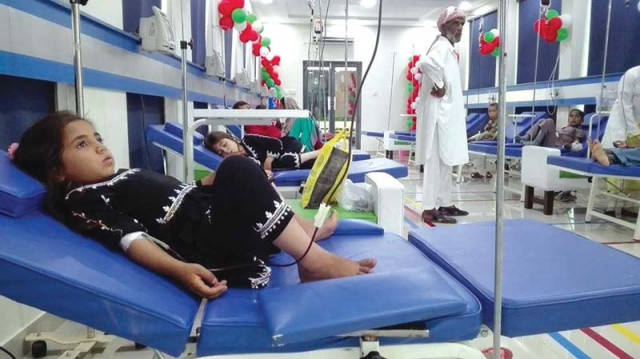Thalassemia Day: In absence of law, experts urge proactive blood screening
Health minister says they are focusing on prevention strategies for the incurable disease

Health minister says they are focusing on prevention strategies for the incurable disease. PHOTO: EXPRESS/FILE
His two daughters, 15-yearold Tanzila and 12-year-old Shukria have been diagnosed with major Thalassemia and are brought to Hayatabad Medical Complex (HMC) for regular blood transfusion.
Luckily for Muhammad, his daughters have blood groups, AB positive and B positive respectively, which are easily available with the HMC administration. “Sometimes it becomes really difficult. But, after all, I have to take care of them,” the girls’ father told The Express Tribune as he brought them in for a transfusion at the HMC on Monday, World Thalassemia day.
“I want them to live their lives and we [his family] would not hesitate to go to any extent.”
Legal pains
The Khyber-Pakhtunkhwa (K-P) government runs an integrated programme for thalassemia, the human immunodeficiency virus (HIV) and hepatitis, offering free blood screening.
However, the provincial government has been struggling to pass a law which makes it mandatory for couples to undergo blood screening for such diseases before marriage.
The chief hurdles holding the government back from tabling the bill before the provincial legislature are said to be cultural barriers in the deeply conservative province.
On the other hand, health experts have termed the bill to be somewhat critical to counter the disease. The say that parents who are about to have a child must undergo Haemoglobin Electrophoresis tests [blood tests to detect different types of haemoglobin].
The tests are usually carried out between the 11th and 41st week of pregnancy and babies if found positive for major Thalassemia, can be aborted during the specified time. A religious edict (a Fatwa) has declared that aborting babies before a certain time for health reasons was permissible in Islam.
“Legislation is important since it [Thalassemia] cannot be cured but it [legislation] is a sensitive issue,” K-P Health Minister Shahram Khan Tarakai said while addressing an event on Thalassemia at the HMC on Monday.
“We are not only putting all our efforts on prevention but on both the issues [including legislation],” he added.
The health minister stated that for those involved in the programme, it was important to prevent such incurable diseases from spreading.
“Since there is no cure for it, we need to focus more on prevention and soon centres at all divisional headquarters will be in place to advocate for this purpose to protect the next generation from this disease,” Tarakai said.
The Integrated Programme Project Director Dr Ayub Roz stated that other countries had made strides in controlling the spread of Thalassemia and had legislation in place for this purpose. He added that having a law in K-Pin this regard would be beneficial.
HMC Pathology Department Head Dr Shah Taj stated that while they did not have exact data, there are believed to be around 6,000 carriers of abnormal genes while 946 Thalassemia patients were registered with HCM. Of these, he said, 13 per cent hailed from the neighbouring Afghanistan.
Published in The Express Tribune, May 9th, 2017.













COMMENTS
Comments are moderated and generally will be posted if they are on-topic and not abusive.
For more information, please see our Comments FAQ